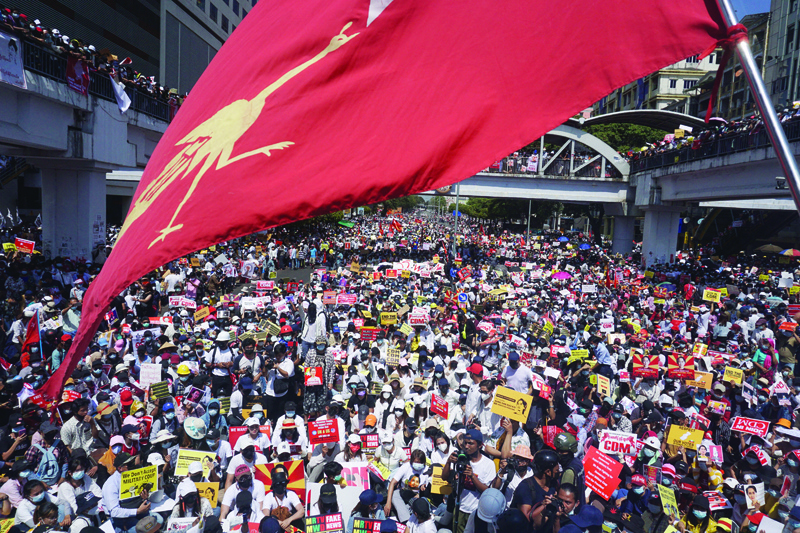 YANGON: Protesters block a major road during a demonstration against the military coup in Yangon yesterday.-AFP
YANGON: Protesters block a major road during a demonstration against the military coup in Yangon yesterday.-AFP
YANGON: Myanmar's anti-coup protesters returned to the streets in force yesterday with the biggest demonstrations since troops fanned out around the country to quell opposition to the new military junta. Much of the country has been in open revolt since the military deposed Nobel laureate Aung San Suu Kyi's government at the start of the month and charged her under an obscure import law.
Tens of thousands rallied in Yangon, with protesters blockading roads with vehicles to stop security forces from moving around the nation's biggest city. "We have to fight until the end," Nilar, a 21-year-old student who asked not to use her real name, said.
"We need to show our unity and strength to end military rule. People need to come out on the streets." Yesterday's crowds came in defiance of more violent efforts by the regime to bring resistance to heel, following nationwide street protests and a disobedience campaign encouraging civil servants to strike.
Demonstrations over the past two days had been noticeably smaller since troops were deployed around Yangon on the weekend. But social media platforms were flooded with calls for a show of force by protesters in the hours before the junta imposed a third consecutive overnight internet blackout.
By noon, there were anti-coup demonstrations across Myanmar, from the remote highlands region of Chin state to a small town in the Irrawaddy delta that saw a parade of protesters hoisting Suu Kyi posters. Right outside the capital Naypyidaw, tens of thousands of people from different sectors-including engineers, doctor, and teachers-marched through the logging town of Pyinmana carrying signs saying "Help Myanmar".
UN special rapporteur Tom Andrews warned that reports of soldiers being brought into Yangon could lead to the situation there spiraling out of control. "We could be on the precipice of the military committing even greater crimes against the people of Myanmar," he said.
Meanwhile, the lawyer representing Myanmar democracy hero Aung San Suu Kyi said yesterday he is preparing for the worst in a trial he fears could take six months. Attorney Khin Maung Zaw is defending the ousted civilian leader, who was detained during the February 1 coup on an obscure charge under the country's import and export law for having walkie-talkies at her home.
Yesterday, the military regime hit Suu Kyi with a second criminal charge, accusing her of holding an election campaign event last year which the junta claims breached coronavirus restrictions under natural disaster management laws. "We hope for the best but are prepared for the worst," Khin Maung Zaw told AFP by phone, adding he is hoping for a fair trial.
The veteran human rights lawyer said he applied yesterday for permission to speak to his client and receive instructions ahead of the next court hearing on March 1. "When will this be granted? I don't know," he said.
'Not what China wants to see'
Military spokesman Zaw Min Tun said Tuesday that both Suu Kyi and Win Myint were in a "safer place" and "in good health". "It's not like they were arrested-they are staying at their houses," the general told a press conference. More than 450 people have been arrested since the coup, according to the Assistance Association for Political Prisoners monitoring group.
Western powers and the United Nations have repeatedly condemned the leaders of Myanmar's new military administration, which insists it took power lawfully. China had initially not criticized the coup, which Chinese state media described as a "cabinet reshuffle". However, Beijing's ambassador to Myanmar said Tuesday that the current situation in the country was "absolutely not what China wants to see".
Music as a weapon
From a classical orchestra playing a revolutionary song to viral breakdancers performing Michael Jackson anthems-young Myanmar anti-coup protesters are using music as a weapon against the country's generals. Since the military ousted civilian leader Aung San Suu Kyi on February 1, big cities and isolated villages alike have mounted a revolt.
Across the country, people have chanted and drummed pots and pans in a daily chorus of dissent, while young composers, choreographers and musicians have expressed their junta resistance creatively. In downtown Yangon this week, a large rebel youth orchestra of violin, cello, trombone, percussion players and an arched Myanmar harp, calling themselves "Generation Z MM", debuted a new protest song called "Revolution".
For 25-year-old vocalist Pan, performing with the orchestra is cathartic at a time of high stress and anxiety over her country's future. "The meaning of the song we were playing is 'With the flesh and blood of our young people, we will try to end the military dictatorship'," she told AFP. "Music can pierce through everybody's heart at any time. I believe that everyone who was listening to our performance will be inspired." - AFP




